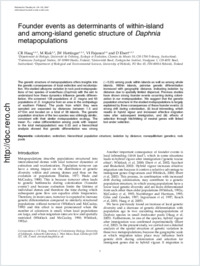Founder events as determinants of within-island and among-island genetic structure of Daphnia metapopulations
- Haag, Christoph R. Ecology and Evolution, Department of Biology, University of Fribourg, Switzerland - Tvärminne Zoological Station, Hanko, Finland - Zoologisches Institut, Universität Basel, Switzerland
- Riek, Myriam Tvärminne Zoological Station, Hanko, Finland - Zoologisches Institut, Universität Basel, Switzerland
- Hottinger, Jürgen W. Ecology and Evolution, Department of Biology, University of Fribourg, Switzerland - Tvärminne Zoological Station, Hanko, Finland - Zoologisches Institut, Universität Basel, Switzerland
- Pajunen, V. Ilmari Tvärminne Zoological Station, Hanko, Finland - Department of Biological and Environmental Sciences, University of Helsinki, Finland
- Ebert, Dieter Ecology and Evolution, Department of Biology, University of Fribourg, Switzerland - Tvärminne Zoological Station, Hanko, Finland - Zoologisches Institut, Universität Basel, Switzerland
-
27.12.2005
Published in:
- Heredity. - 2006, vol. 96, p. 150–158
Colonization
Extinction
Hierarchical population structure
Isolation by distance
Nonequilibrium genetics
Rock pools
English
The genetic structure of metapopulations offers insights into the genetic consequences of local extinction and recolonization. We studied allozyme variation in rock pool metapopulations of two species of waterfleas (Daphnia) with the aim to understand how these dynamics influence genetic differentiation. We screened 138 populations of D. magna and 65 populations of D. longispina from an area in the archipelago of southern Finland. The pools from which they were sampled are separated by distances between 1.5 and 4710 m and located on a total of 38 islands. The genetic population structure of the two species was strikingly similar, consistent with their similar metapopulation ecology. The mean FPT value (differentiation among pools with respect to the total metapopulation) was 0.55 and a hierarchical analysis showed that genetic differentiation was strong (>0.25) among pools within islands as well as among whole islands. Within islands, pairwise genetic differentiation increased with geographic distance, indicating isolation by distance due to spatially limited dispersal. Previous studies have shown strong founder events occurring during colonization in our metapopulation. We suggest that the genetic population structure in the studied metapopulations is largely explained by three consequences of these founder events: (i) strong drift during colonization, (ii) local inbreeding, which results in hybrid vigour and increased effective migration rates after subsequent immigration, and (iii) effects of selection through hitchhiking of neutral genes with linked loci under selection.
- Faculty
- Faculté des sciences et de médecine
- Department
- Département de Biologie
- Language
-
- English
- Classification
- Biological sciences
- License
- License undefined
- Identifiers
-
- RERO DOC 5919
- DOI 10.1038/sj.hdy.6800774
- Persistent URL
- https://folia.unifr.ch/unifr/documents/299993
Statistics
Document views: 200
File downloads:
- haag_fed.pdf: 140
